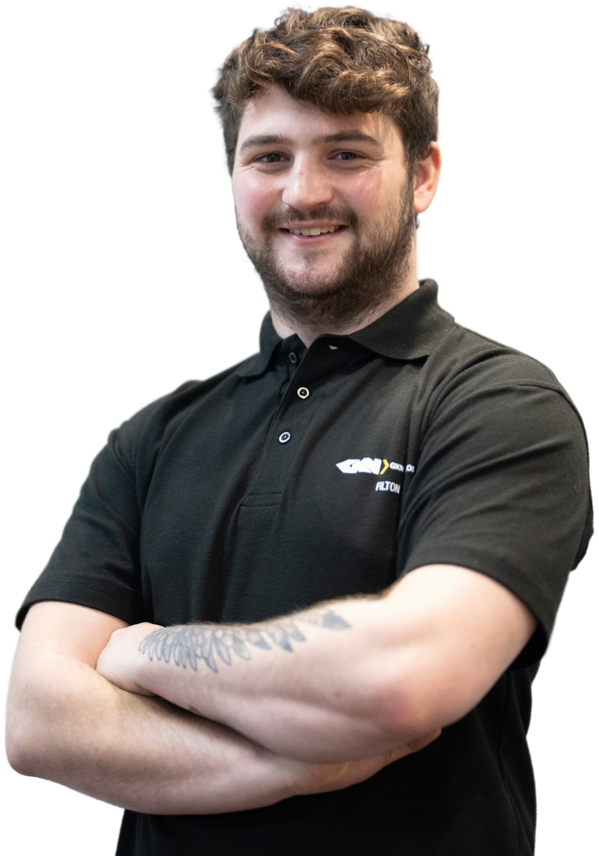ENGINEER THE FUTURE
Engineering is what makes the world work, and though there are a multitude of types of engineer, their primary focus is problem solving.
Use this page to discover more about the work Engineers do, the careers out there today and the courses that can get you there...

FIND YOUR FUTURE IN ENGINEERING
What is an engineer?
Engineers research, invent and refine processes across a wide range of fields including medicine, transport, electronics, and much more. Almost every object has been manufactured in some way, and this has ben the result of an engineer, whether it be on a mass scale of a factory, or homemade.
Engineers, however, must consider the limitations of their work imposed by practicality, regulation, safety and cost.
Engineering can be broken down into many different roles including electrical engineering, Civil Engineering, Mechanical Engineering and Chemical Engineering. Each role differ hugely from each other, and yet still are focused on the development of everything in our society.
Find out more on the breakdown of engineering roles!
Why choose engineering?
A career in engineering allows you be truly creative in the process of inventing and designing, while also requiring the skills to build and test your design, all while analysing how the project could be improved. This procedure allows for the satisfaction of seeing a project through to completion. While considering this procedure, and the fact that the subject is ever-evolving, no two days will ever look the same when working in engineering!
As well as these incredible benefits of choosing engineering as your career path, engineering qualifications will lead you to many job opportunities! With engineers being so versatile in the projects that they work in, developments of every industry in society will require engineers, resulting in the high demand.
What Skills does an engineer need?
While skills including perseverance, mathematical skills and creativity are crucial for a successful career in engineering, natural-born problem solvers will thrive the most in the environment.
While being logical, practical and analytical, you’ll also be encouraged to be creative and think outside the box to find new solutions to solve new problems.
Type of engineer: what's the difference?
Electrical Engineer
An electrical engineer designs, builds and maintains electrical systems, machinery and equipment. Without electrical engineers, computers, phones, TVs and all other electronics wouldn’t exist.
To become an electrical engineer, you’ll need knowledge of engineering science and technology, as well as maths, computing operating systems, hardware and software. You’ll also need a keen eye for detail, with determination and excellent communication skills.
Salary: £33,569
Your day-to-day tasks will depend on the industry you're in. You could:
- carry out feasibility studies for new technical developments
- draw up project plans and circuit diagrams using computer-assisted engineering and design software
- estimate costs and project timings
- coordinate the work of technicians and craftspeople
- test installations and systems, and analyse test data
- make sure projects meet safety regulations
- oversee inspection and maintenance programmes
- attend meetings, write reports and give presentations
Civil Engineering
Civil Engineers design things we see in our day to day lives; from our houses, to bridges, roads and sewers.
Civil Engineers have a very diverse workload, and will be involved in all aspects of projects from scheme design through to construction on site. Alongside this, liaising with other team members will be crucial to support one another.
Salary: £32,128
Civil engineers are often responsible for large teams that are involved in project design, planning, and construction processes. This requires that they regularly meet, collaborate with, and manage these team members, composed of surveyors, construction managers, architects, landscape architects, and urban planners.
In addition, they themselves will spend significant amounts of time designing and planning projects and presenting proposals, needs assessments, budgets, and amendments to clients.
Mechanical Engineering
Mechanical engineers participate in the planning and manufacturing of new products by performing engineering duties and developing, designing and testing mechanical devices.
Mechanical engineers work with other team members to create new product designs that meet customer needs and relevant government codes and regulations. They create these designs using established engineering practices and relevant technological tools. They research designs and make recommendations based on appearance, safety, budget, and function, and estimate the time and cost needed to complete projects.
Salary: £32,405
As a mechanical Engineer, you’ll be responsible for:
- Translate requirements and functional design specifications into mechanical CAD design
- Deliver innovative technical design and functional solutions that support programme deliverable.
- Capture and record design rationale and associated technical risks.
- Engage with the wider project team to deliver cost effective, compliant 3D models ready for product definition.
- Ensure that the physical and functional mechanical integration of electrical, automation and control systems meet all programme requirements.
Chemical Engineering
Chemical engineers develop and design chemical manufacturing processes, and work for a variety of employers, such as chemical production companies (for example pharmaceuticals, construction, petrochemicals, food processing, electronics, plastics and polymer manufacturers), the water treatment industry, and the environmental health and safety industries.
Salary: £33,391
As a Chemical Engineer, you will:
- Ensure products are produced efficiently
- Ensure technical problems are solved safely and economically
- Be highly skilled in maths and chemistry and commercially aware
- Be analytical
- Work well under pressure
- Good teamwork and communication skills
- IT and relevant specialist technical knowledge
Engineering Technician
Engineering technicians perform a variety of technical support functions to assist engineers with the design, development, operation, installation and maintenance of engineering systems and constructions.
Salary: £35,763
Tasks
- Visits and advises clients on the use and servicing of mechanical and chemical engineering products and services.
- Inspects completed aircraft maintenance work to certify that it meets standards and the aircraft is ready for operation.
- Diagnoses and detects faults and implements procedures to maintain efficient operation of systems and equipment.
- Prepares estimates of materials, equipment and labour required for engineering projects.
- Sets up equipment, undertakes tests, takes readings, performs calculations and records and interprets data.
- Plans and prepares work and test schedules based on specifications and drawings.
Design Engineer
A design Engineer is primarily responsible for turning customer requirements into viable ‘ready for production’ designs, including generating Bill of Materials and working instructions as part of the design process.
Salary: £30,109
Tasks:
- Create and design products in line with customer requirements
- Rectifying day to day technical and design issues and assisting the production team with their daily challenges.
- Leading a drive for continuous improvement, including helping to close the feedback loop on quality.
- Training apprentices and providing the support they need with their academic work.
- Supporting the Sales team with any design and technical enquires.
- Supporting the After sales team with the after-sales technical issues
- Striving to improve efficiency and sustainability of processes and product designs, and to reduce waste.
- Assuring that quality and compliance guidelines are met.
Nuclear Engineer
Nuclear engineers are known to design, build, run, or decommission nuclear power stations. They work in multi-disciplinary teams, and come to technical solutions for the problems that they face.
Depending on the role, they could be designing totally new systems, maintaining existing systems or looking for ways to improve the efficiency, stability and sustainability of nuclear power plants.
Another important task is decommissioning facilities, as well as planning and carrying our safety procedures for transport, storage and the disposal of radioactive material used in nuclear plants.
Salary: £45,450
As a nuclear engineer, you'll need to:
- understand the science behind how nuclear facilities work
- analyse energy transmission, conversion and storage systems
- solve design or operational problems with reactor cores and shielding, hydraulic and electrical systems, and complex instrumentation such as monitoring equipment
- manage staff and budgets for complex design, construction, maintenance, expansion, safety and decommissioning projects
- always keep the safety of people and the environment in mind, cooperate with local emergency services, and work with national, European Union (EU) and international industry regulatory bodies
- be aware of and address security concerns regarding the use, transport, storage and disposal of radioactive materials
Test Engineer
Test engineers work creatively to design tests for products, materials, mechanical and electrical systems, procedures and software application. The tests serve as part of a company’s rigorous quality assurance program, and the engineers design tests for all types of products to identify trouble spots and fix them. The job requires new approaches to test product limits and a knowledge base about types of tests for different issues like increasing the speed of a device or software, making the product safer for consumers and cutting costs in the manufacturing process.
Salary: £30,612
A typical day could include:
- collecting data and analysing results and patterns
- collating regular progress reports and feedback on usability and serviceability
- testing any returned or faulty products
- fixing bugs
- interacting with other teams to analyse, document and interpret product tests
- recommending alternative strategies within product development
- ensuring testing procedures are compliant with any required industry standards






